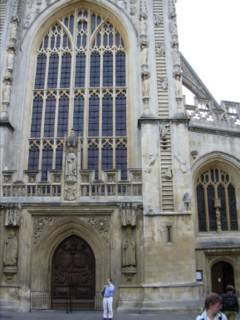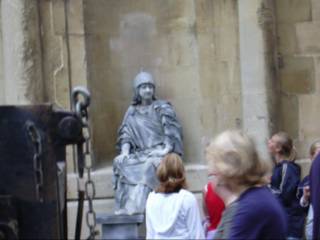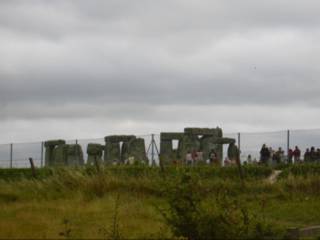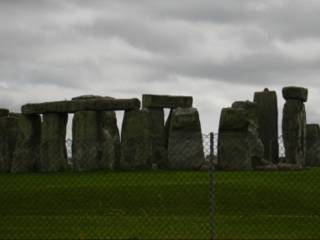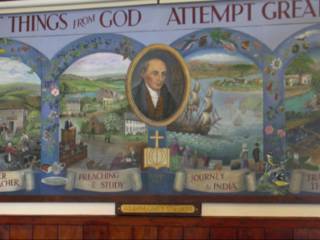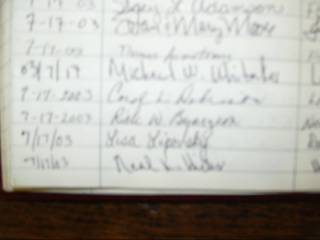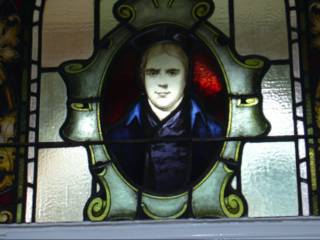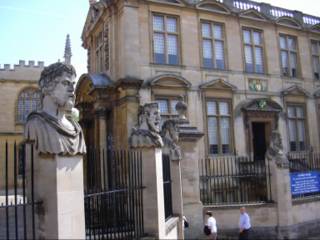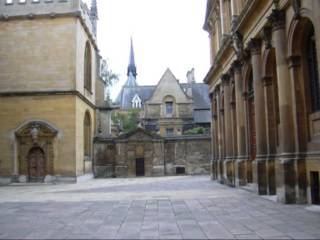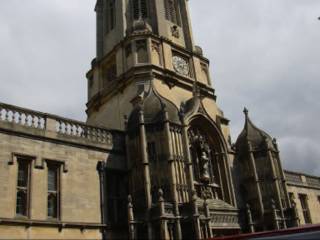I wanted to post this discussion because I think it might be helpful.
Frank
I have no real problem with most nouthetic counseling just as I have no problem with most modern psychology.
But problems arise when the two begin to assume the role of the other.
Many whom I have talked to who support nouthetic counseling and dislike all modern psychology have only read a few Adams books. They hear Bible-only and believe that this way must be the best.
I am sorry but the Bible was never intended to be a counseling handbook anymore than it was intended to be a science book.
The Scriptures can be used to heal the soul and cure sin if one has faith in Christ.
But what about those who don't have faith? Or what about those who have a chemical imbalance? What about those with genetic problems? What about those with a behavioral problems? What about those with suffering from abuse?
There are three problems with much modern nouthetic counseling.
1) Many advocates have an incorrect view of the makeup of man.
2) Many advocates have an incorrect view of what psyschology involves.
3) Many advocates have an incorrect view of the purpose of the Scriptures.
If we continue in our inaccurate views about nouthetic counseling, we will become some new form Christian Scientists.
I hope these problems are just symptomatic of the diletantes of counseling and not the whole field of nouthetic counselors.
Earnest 1
2 Timothy 3:16
While it is true that nouthetic counselors generally may not prescribe drugs, it is not true that the scripture is not able to address problems of behavior and abuse. God's Word is the final authority whether one is a believer or not. Anyting that deviates is strictly the opinion of man and as such is highly susceptible to error.
Frank
But we are not speaking of opinions that deviate from Scripture. We are speaking of opinions that are not mentioned in Scripture and, therefore, are up for for grabs.
Some, perhaps, most behavior and much abuse can be and should be dealt with by nouthetic counseling. Very few believers would deny that truth. The issue is whether or not all problems that fall under the secular umbrella of psychology can be dealt with by nouthetic counseling or whether some problems must be dealt with using modern methods.
Not all problems that that physicians face are physical and not all problems that psychologists face are mental. It's not as clean cut as that. The human self is not as clean as that. Our minds are both spiritual and physical. The Bible speaks to both aspects of man (all of the spiritual issues) but not to all of the physical issues.
Yes, I suppose if we all had perfected faith then both the physical and spiritual aspects of our minds could be healed. If we have faith we can be healed of physical ailments, so says the Scriptures. Does that mean that we should cease seeing physicians and start forming nouthetic hospitals to cure the flu?
God gave us the abilities to prevent the flu. He gave us the abilities to help those suffering from mental problems. Let's not cause a whole lot of people to suffer because of another spiritual fad.
Earnest 2
quote: But what about those who don't have faith?
For these, the Bible has the answer.
quote: Or what about those who have a chemical imbalance?
Nouthetic counseling recommends that the first homework assignment for a counselee is a complete medical workup to rule out chemical imbalances.
quote: What about those with genetic problems?
What is the behavior or attitude that is affected by this? That determines how it is handled.
quote: What about those with a behavioral problems?
Behavioral problems are a lack of self-control, which is a fruit of the Spirit. The answer to this is always biblical.
quote: What about those with suffering from abuse?
The answer to this is found in Scripture as well, aligning one's view of life with the truth of God.
Very often, people underestimate the value of the Bible because of the line that "the Bible is not a counseling manual." That is a very limited view of the Bible.
Frank
But what about those who don't have faith?
"For these, the Bible has the answer."
Yes, but what if they disbelieve the Bible. Do we refuse to help them when other methods work they will accept work.
Which brings up another point ... Do modern methods of psychology work?
Or what about those who have a chemical imbalance?
"Nouthetic counseling recommends that the first homework assignment for a counselee is a complete medical workup to rule out chemical imbalances."
Good.
What about those with genetic problems?
"What is the behavior or attitude that is affected by this? That determines how it is handled."
Autism, mood disorders, personality disoders, schizophrenia, etc.
What about those with a behavioral problems?
"Behavioral problems are a lack of self-control, which is a fruit of the Spirit. The answer to this is always biblical."
Autism, attention deficit, schizophrenia, sleep disorders, Tourette's syndrome, dissociative identity disorder (MPD), amnesia, "stuttering", etc.
Yes, the person cannot control his self. In many cases the fact that he cannot control his self is not because he hasn't the fruit of the spirit but because we live in a fallen world and bad things happen to good people.
"The answer to this is found in Scripture as well, aligning one's view of life with the truth of God. Very often, people underestimate the value of the Bible because of the line that 'the Bible is not a counseling manual.' That is a very limited view of the Bible."
Alligning one's view of life will not make all bad things go away. It will not always cure cancer or heart disease or cure autism and MPD. The Bible will teach one about Christ and how to have a relationship with Him. In this trusting relationship one finds peace inspite of the sufferings whether physical or psychological or spiriutal.
I don't think I have "limited view of the Bible" but I do beleive I have a accurate view. I have seen books on how to use the Bible to get wealthy, to get healthy, and to predict the future. The Bible Codes, anyone? Today, I see books about the Scriptural view of diets. And don't even get me started on science and how God created creation as reflected in the Scriptures.
I am sure those who dabble in Old Testament diets think they have a high view of the Scripture too.
I think we do damage to the witness of the Scriptures when we start applying it to thigns it was never meant to be applied. We then distract from what it was intended to do.
Earnest 2
quote: But we are not speaking of opinions that deviate from Scripture. We are speaking of opinions that are not mentioned in Scripture and, therefore, are up for for grabs.
Such as?
quote: Not all problems that that physicians face are physical and not all problems that psychologists face are mental.
Actually, physicians refer patients with problems that they believe are mental.
quote: God gave us the abilities to prevent the flu. He gave us the abilities to help those suffering from mental problems. Let's not cause a whole lot of people to suffer because of another spiritual fad.
I absolutely agree. The spiritual fad that should be rejected is integrationism ... the minimization of the Bible to the mere level of human psychology. The Bible has a much higher position than that. We should not cause people to suffer by offering solutions that don't really work in the long run.
Earnest 2
quote: Yes, but what if they disbelieve the Bible. Do we refuse to help them when other methods work they will accept work.
I guess that depends on what you mean by "work." Do you want real solutions or not?
quote: Autism, mood disorders, personality disoders, schizophrenia, etc.
Autism is not a problem treatable by counseling. The other things you mention all have biblical solutions, if we will pursue them.
quote: Autism, attention deficit, schizophrenia, sleep disorders, Tourette's syndrome, dissociative identity disorder (MPD), amnesia, "stuttering", etc.
Some of these are not really behavioral problems per se. You are mixing some things up here. We need to make valid distinctions between behavioral disorders such as ADD or ADHD (which is dealt with by the biblical discpline of self-control) and things such as sleep disorders (which can stem from a number of issues including an unbiblical approach to worry and stress), amnesia (which has nothing to do with behavioral issues), etc. Some of these are genuine medical issues and some are not.
quote: Yes, the person cannot control his self. In many cases the fact that he cannot control his self is not because he hasn't the fruit of the spirit but because we live in a fallen world and bad things happen to good people.
There are no good people. One of hte problems of modern pscyhology is the misdiagnosis that there are good people. All are sinners and we live in a sin cursed world. All of these problems stem from that to be sure. But a lack of self-control is always a lack of the fruit of the Spirit. That is the root cause.
quote: Alligning one's view of life will not make all bad things go away. It will not always cure cancer or heart disease or cure autism and MPD. The Bible will teach one about Christ and how to have a relationship with Him. In this trusting relationship one finds peace inspite of the sufferings whether physical or psychological or spiriutal.
Having a proper view of God and life will not make the bad things go away, but it will enable the individual to deal with those bad things in a biblical way. Your last statement sums up the issue that you have seeminly argued against. When you know Christ and understand him, there are answers to these problems. It doesn't cure medical issues to be sure; no one should claim that it does. But it does deal with the spiritual side of man, which is where most counseling problems come from.
quote: I have seen books on how to use the Bible to get wealthy, to get healthy, and to predict the future. The Bible Codes, anyone? Today, I see books about the Scriptural view of diets. And don't even get me started on science and how God created creation as reflected in the Scriptures.
Some of these types of books are misuses of hte Bible. But with respect to the last part, much of the problem in modern psychology comes from teh denial that man was the special creation of God in his own image.
quote: I think we do damage to the witness of the Scriptures when we start applying it to thigns it was never meant to be applied. We then distract from what it was intended to do.
I completely believe this and that was my point to begin with. When we lower its value to a mere commentary on history, rather than that which equips us for every good work, then we have lost its value.
Frank
“Such as?”
Mental and physical problems not addressed in Scripture (these are the problems that good psychology attempts to address)
“Actually, physicians refer patients with problems that they believe are mental.”
Exactly! They refer patients to others because the mental and spiritual is not their expertise. The mental is the expertise of the psychologists and the spiritual is the expertise of the Christian minister. I would prefer a Christian psychologist that can counsel both to the mental and the spiritual. Why should be abandon counseling of the mind to the secularists? We then lose the chance to witness to the lost and guide them to Christ.
“I absolutely agree. The spiritual fad that should be rejected is integrationism ... the minimization of the Bible to the mere level of human psychology. The Bible has a much higher position than that. We should not cause people to suffer by offering solutions that don't really work in the long run.”
Really the negative integrationism that is being applied by many is a Platonic view of the self (as opposed to the Biblical model) that was perpetuated by many of the Apostolic fathers, Augustine included. Many of these men of God were not necessarily minimizing the Bible but, instead, were trying to explain the Biblical principles to a pagan world by using Greek philosophical principles, much like how John uses the Logos in his Gospel. Did they go too far at times? Oh yes, and their followers took it even further down the road to heresy. There were other Apostolic fathers who went the other route and wanted to show the world the diametrically opposed Kingdom of God. These men of God were not necessarily isolating the church from the world with which they were supposed to be witnessing but they occasionally went too far and some their followers certainly went too far. There is definitely a balance that must be maintained.
Solutions to sin can only be found in Christ as found in the Scriptures. But problems that are not sin can be dealt with by other means, means that work both in the short run and in the long run. Will psychological methods cure the problem of sin? No.
Frank
“I guess that depends on what you mean by "work." Do you want real solutions or not?”
Solutions to sin: nouthetic. Solutions to physical and mental problems that do not come under the umbrella of sin: well?
“Autism is not a problem treatable by counseling. The other things you mention all have biblical solutions, if we will pursue them.”
Actually autism can be treated with counseling.
Many of the other problems I mentioned are caused by more than just one cause. Some are biological (neurological, genetic), others are behavioral (social, etc.), others are spiritual.
“Some of these are not really behavioral problems per se. You are mixing some things up here. We need to make valid distinctions between behavioral disorders such as ADD or ADHD (which is dealt with by the biblical discpline of self-control) and things such as sleep disorders (which can stem from a number of issues including an unbiblical approach to worry and stress), amnesia (which has nothing to do with behavioral issues), etc. Some of these are genuine medical issues and some are not.”
“Behavior” is defined as “a way of conducting or acting.” The behavioral sciences (sociology, psychology, etc.) study human behavior.
AD/HD, again, has both biological (neurological, possibly genetic) and psychosocial causes.
Yes, sleep disorders can be caused by unbiblical approaches to worry and anxiety but not always. The question is if the problem is not an unbiblical approach can or should a Christian counselor use other methods?
Sometimes problems are physical and sometimes problems are mental and sometimes problems are spiritual. We shouldn’t look at man through the eyes of Plato and Descartes.
One talks about integration … Here is the real integration. The church has adopted a secular view of man.
The world views man as totally material. The Bible teaches that man is also spiritual. The world tends to divide man into the physical-material and the psychological-material. They see psychology as addressing psyche (the soul) which they view as the mind which they view as material and unspiritual. The church responds correctly that man is more than just material but incorrectly assents to the world’s view of assigning all “unphysical” problems to the realm of psychology.
The secular world equates spiritual problems with mental problems and attempts to address both. While these two are not mutually exclusive, neither are they identical. Secular Psychologists are unequipped to deal with spiritual matters. Now the contemporary view of nouthetic counseling is attempting to ill-equip Christian counselors to deal with both mental and spiritual problems. What will happen? People with both mental and spiritual problems will go to secular psychologist for help. We are ceding a whole discipline by being misinformed by the world about the nature of man.
“There are no good people. One of hte problems of modern pscyhology is the misdiagnosis that there are good people. All are sinners and we live in a sin cursed world. All of these problems stem from that to be sure. But a lack of self-control is always a lack of the fruit of the Spirit. That is the root cause.”
I meant good as a relative term, but I’ll rephrase my statement: Bad things happen to righteous people.
Not everyone who cannot control an aspect of his self is lacking the fruit of the Spirit. (Autism, Tourette's syndrome, learning disorders, etc.)
“Having a proper view of God and life will not make the bad things go away, but it will enable the individual to deal with those bad things in a biblical way. Your last statement sums up the issue that you have seeminly argued against. When you know Christ and understand him, there are answers to these problems. It doesn't cure medical issues to be sure; no one should claim that it does. But it does deal with the spiritual side of man, which is where most counseling problems come from.”
You said “most counseling problems come from the spiritual side of man.” I agree, but not all problems come from the spiritual side of man. Some problems are mental and others physical. My issue is whether or not we can treat mental problems that are not sinful in nature and whether or not Christian counselors should be trained by Christian colleges and seminaries to do so. I think they should. I prefer Christian doctors, Christian mechanics, Christian lawyers, and Christian psychologists. Whether or not we have physical and psychological problems we still need the peace of God. And if we find the peace of God that doesn’t mean we can ignore our physical and mental problems.
“Some of these types of books are misuses of hte Bible. But with respect to the last part, much of the problem in modern psychology comes from the denial that man was the special creation of God in his own image.”
True, much modern psychology denies Biblical truths. Much modern medicine denies Biblical truths. Much modern sociology really denies biblical truths. What then do we do? Cede the entire discipline to the world, including those truths of that discipline?
“I completely believe this and that was my point to begin with. When we lower its value to a mere commentary on history, rather than that which equips us for every good work, then we have lost its value.”
I agree.
It’s “good” to treat cancer but the Bible doesn’t tell us how to do so. It’s “good” to fix my Windows XP but the Bible doesn’t tell me how to do so. If we say that the Bible is indirectly equipping us to treat cancer and fix Windows XP then we can say that the Bible is also indirectly equipping us to use the psychology to treat problems that the Bible doesn’t directly address. If we say that treating cancer and fixing Windows XP is not the “good” that is being expressed by the Bible then these disciplines, as well as psychology, fall out of the purview of the Scriptures.

 "Thinking Eternally, Acting Locally." - Neal August
"Thinking Eternally, Acting Locally." - Neal August























